Aug 14, 2024 – Farming, Dharma Q&A, Memorial Service for the Late Mr. Choi Young-jun
Good morning from Dubuk Retreat Center.

After completing his early morning practice and meditation, Sunim began the day by doing farm work from 6 AM. Due to the intense heat during the day, he now only does two hours of farm work early in the morning. Today, he planned to mow the rice paddy ridges with the Dharma teachers.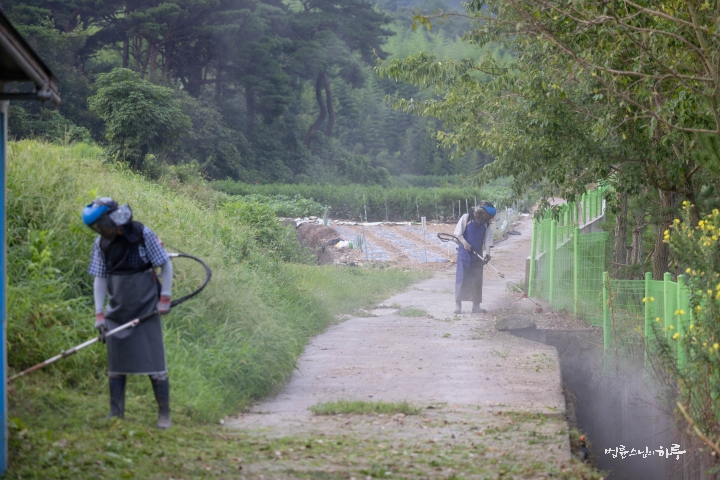
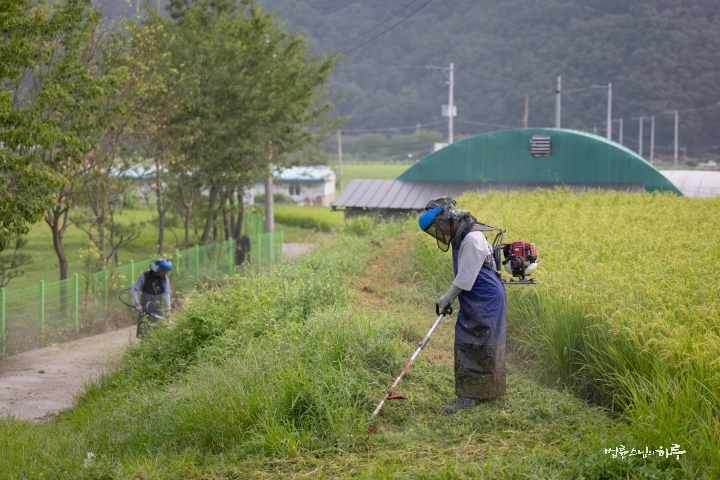
First, he mowed around the farm shed and then moved to the lower rice paddy. The weeds on the ridges had grown so thick that it was hard to distinguish them from the rice field.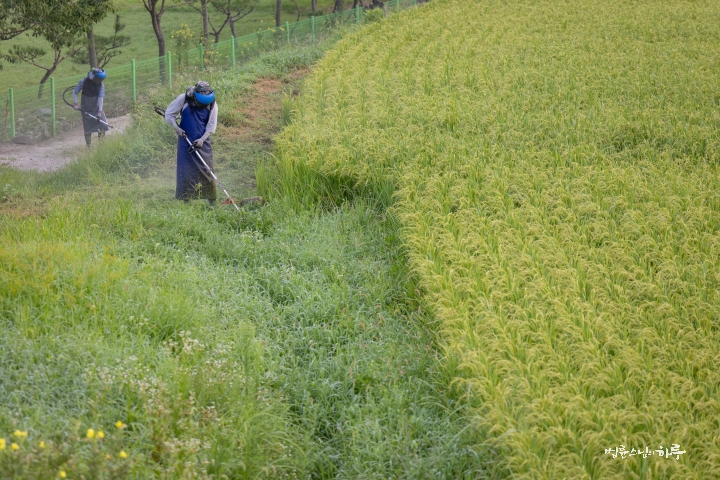
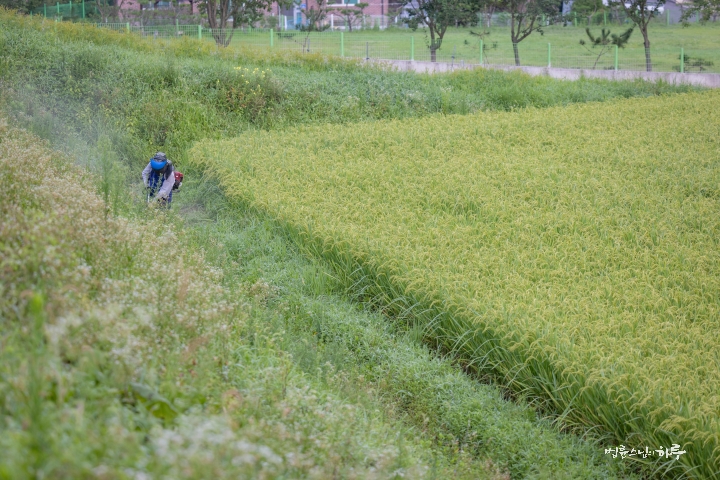
He moved the string trimmer with great concentration to avoid damaging the rice plants. As Sunim mowed along the ridges, the rice plants emerged in neat rows.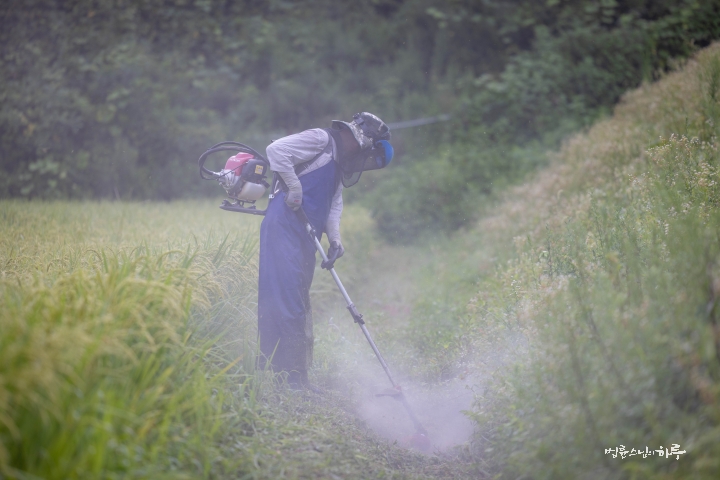
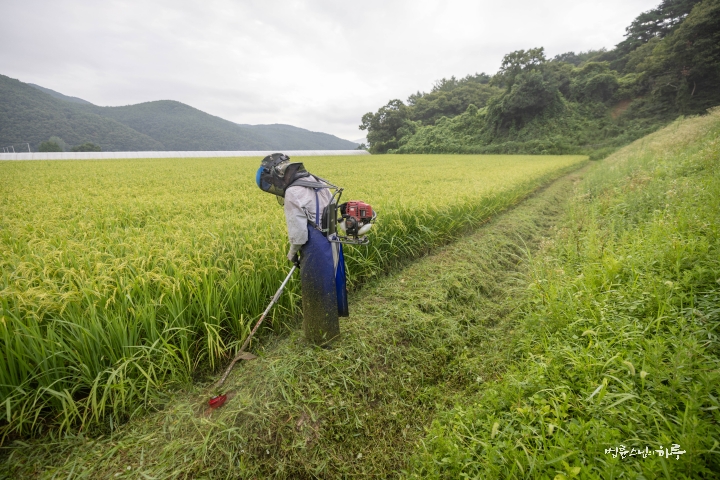
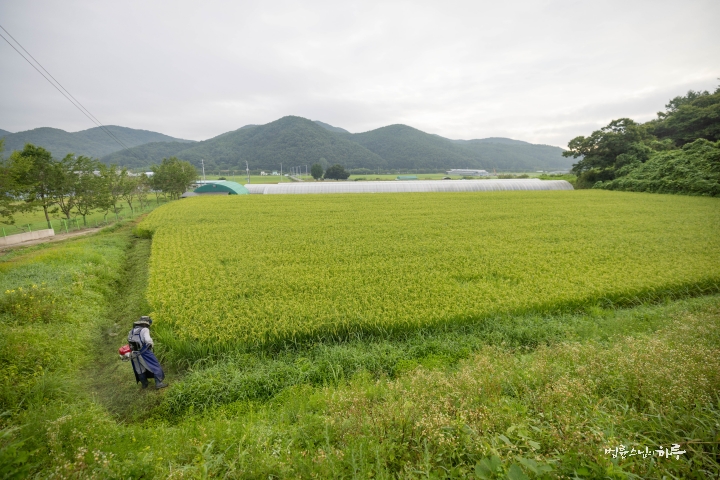
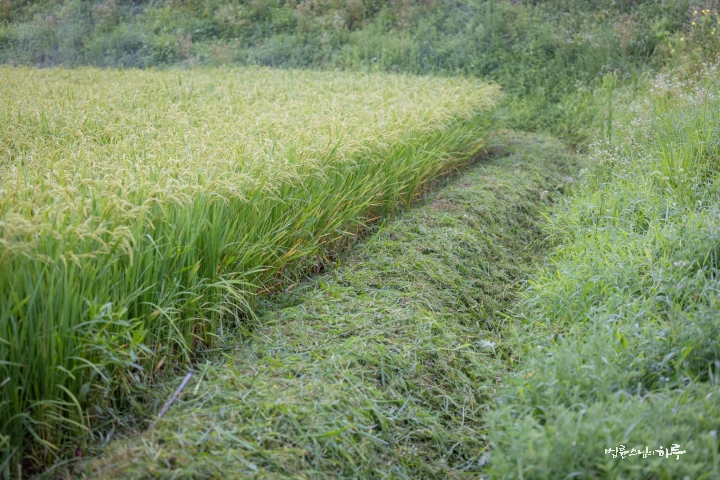
After finishing the lower paddy, he moved up to the upper one.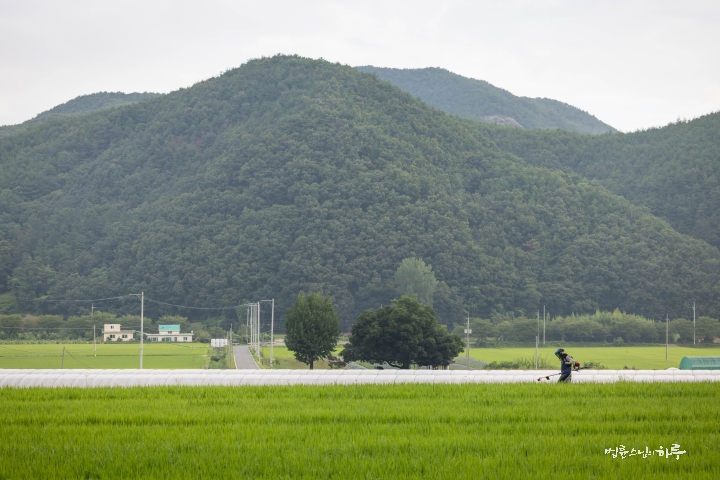
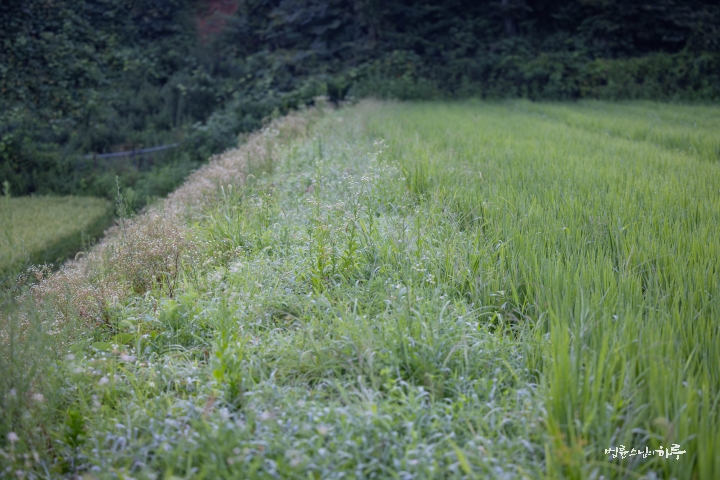
The upper paddy’s ridges were also overgrown with weeds. After mowing around the paddy once, the area around the field looked neatly trimmed.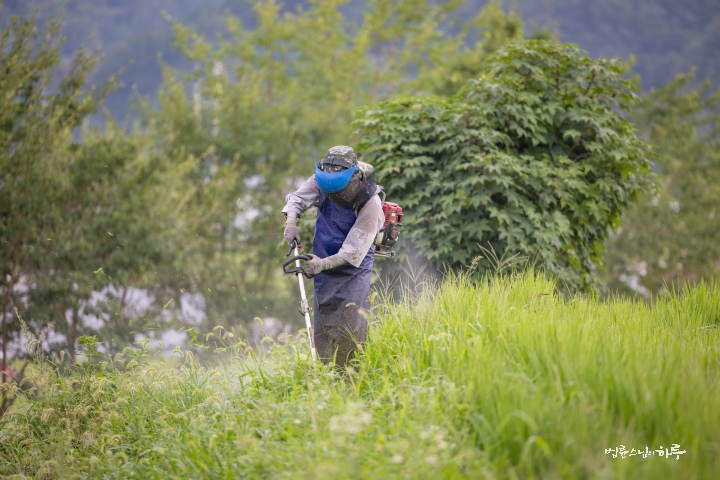
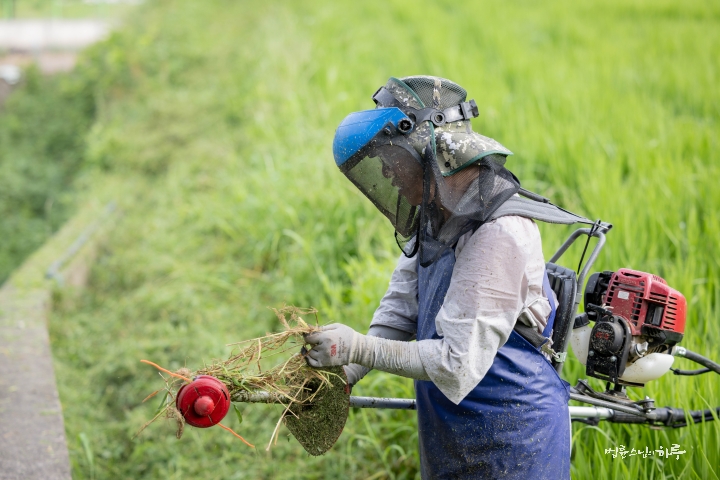
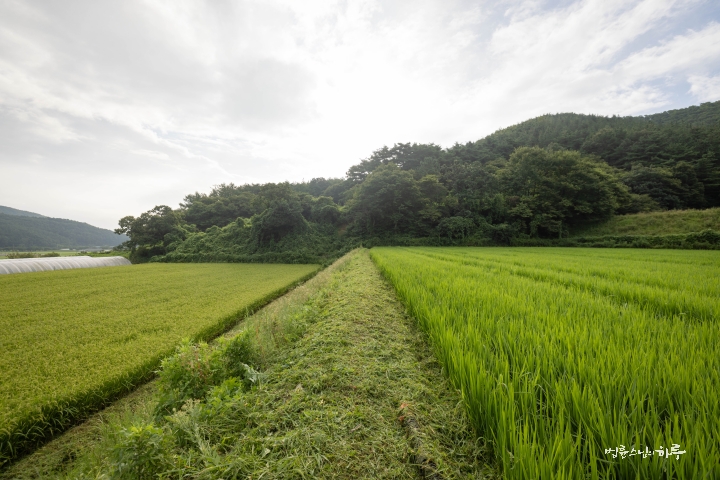
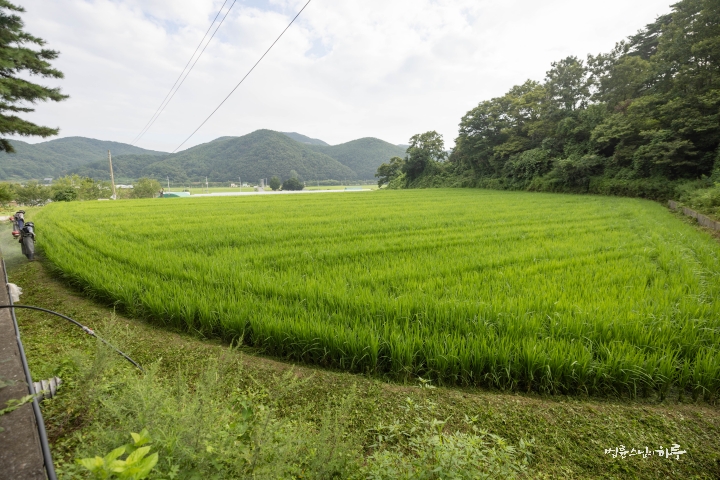
He also neatly mowed the path leading up to the upper paddy.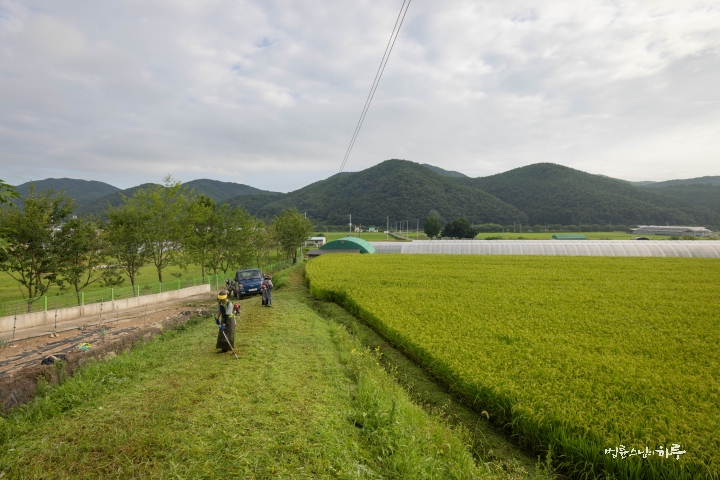
When Sunim took off the string trimmer, his work clothes were soaked with sweat.
“Good job. Let’s finish here for today.”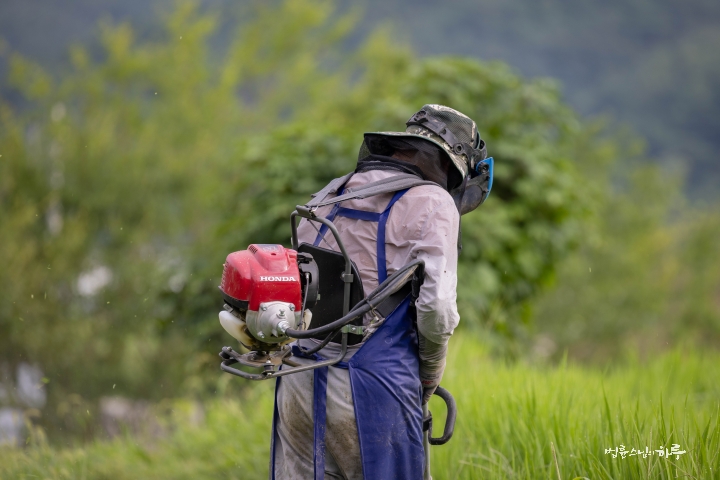
After finishing the farm work, Sunim headed to the broadcasting room at Dubuk Retreat Center to conduct a live Dharma Q&A session. At 10 AM, when all the Jungto Society members had entered the video conference room, Sunim greeted them.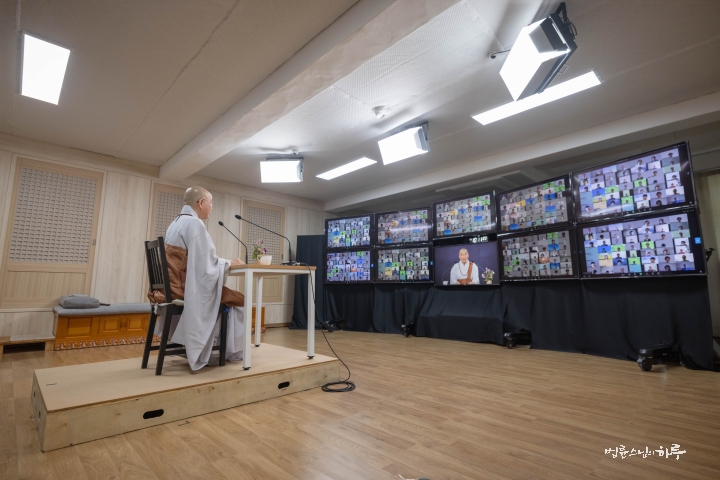
“Now that Jungto Society has finished its summer retreat, we’re entering our full second-half schedule. We started the 6th 100-day practice a few days ago, so I believe you’re all practicing diligently every day. Last week we had the Sutra Course graduation ceremony, and this week we’ll have the Buddhism Course graduation ceremony. So, it seems many new members will be joining Jungto Society in the second half of the year. I ask existing members to welcome the new members warmly.
When attending the Buddhism Course, there are facilitators and co-facilitators who provide attentive care. However, after graduating from the Buddhism Course and Sutra Course, when people start attending the Dharma Q&A sessions, they might feel a bit awkward. It’s because they’re not with the fellow practitioners they studied with, and they also have to participate in the Dharma service rituals. I’ve heard that some people stop coming after attending once or twice. Considering this, I ask not only the group facilitators and leaders but also existing members to take good care of the new members joining your groups. Just as teachers take good care of students in school, but there’s no one to look after you when you enter society, I ask new members not to think that someone must take care of them, but to participate in Jungto Society activities independently and proactively as proud members of Jungto Society.”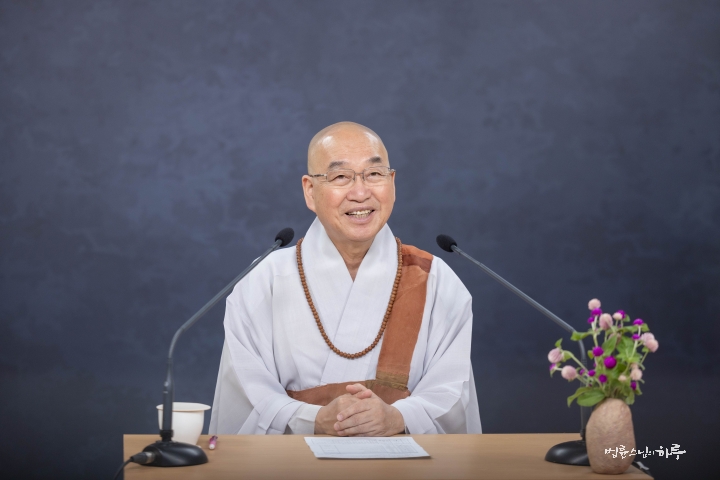
Next, he took questions about any concerns. Three people had pre-registered to ask questions and engage in dialogue with Sunim. One of them sought Sunim’s advice on how to deal with a husband who doesn’t provide living expenses and asks to borrow money from her parents.
My Husband Doesn’t Provide Living Expenses and Borrows Money from My Parents. What Should I Do?
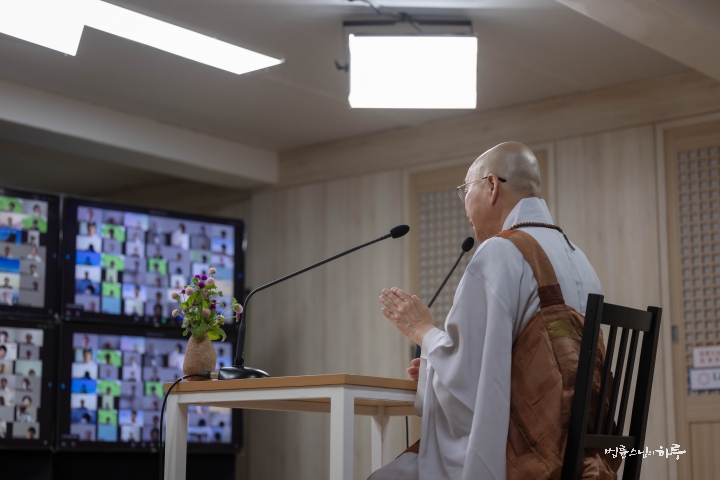
“People who run businesses can experience success, struggle, or even failure. When investing in stocks, prices can rise, stagnate, or fall, causing losses. When lending money, you might receive interest, not receive interest, or even lose the principal. Life is full of variables like these. If you become distressed every time things don’t go as you want, life will always be painful.
That’s why when doing business, one should operate within their own funds or bank loans. If that’s not possible, they should close the business. This way, only their own assets are at risk. Banks have legal measures to recover unpaid loans, but if the borrower truly has no money to repay, there’s nothing that can be done. It’s not wrong if they can’t repay because they have no money, but it is wrong if they have money and don’t repay. However, borrowing from individuals is different. It creates complex relationships, so one should never borrow from individuals for business. This should be a principle to follow when doing business.
If the business is doing well, there’s no need to borrow money. Even if the business is struggling a bit, if banks are willing to lend money, there’s a chance for recovery. But if banks refuse loans, it’s likely that the business has little chance of recovery. In such a situation, using private loans or borrowing from acquaintances or relatives has a very low probability of repayment. That’s why you shouldn’t lend money to friends or relatives. If you feel sorry for them, it’s better to give them money outright rather than lending it. If they ask to borrow 10 million won, it’s better to just give them 1 million or 5 million won. If you lend it, you not only risk not getting the money back but also risk becoming enemies.
But in the questioner’s case, what’s done is done. Her husband has already used her parents’ money, so if he repays it later, they can get it back. If he doesn’t repay and they press for it, they might become enemies. From the lender’s perspective, they’re just asking for their money back, but from the borrower’s perspective, when they’re already struggling, being pressed for repayment can breed resentment. Even if the financial issues are resolved later, the relationship might remain bitter. That’s why I say not to lend money. If you’ve already lent it, you should let it go. This doesn’t mean giving up on getting the money back. It means receiving it if they repay, but not pressuring them too much. You might not only lose the money but also create enmity, so you should mentally let it go. When they ask to borrow more money, if you have it, you can give it, but there’s no need to lend anymore. If you don’t lend from the start, there’s no big problem, but if you stop lending after having lent before, it’s easy to become enemies. If you don’t lend from the beginning, they might feel disappointed but won’t become enemies.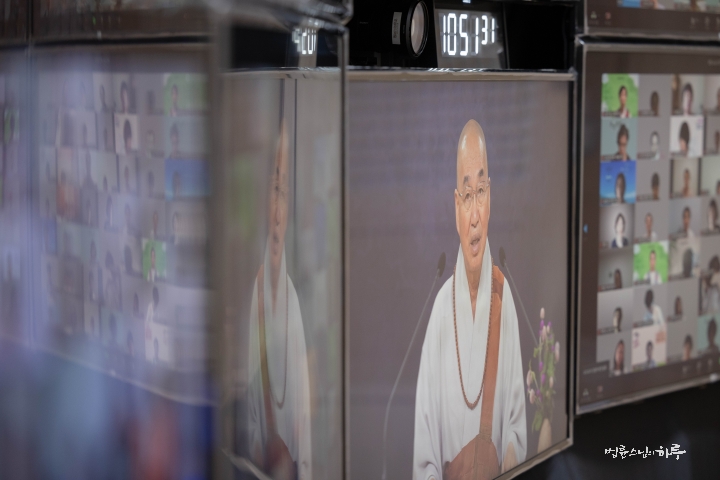
First, the questioner should not mention money issues at all, and instead should comfort her husband. If she had the ability to solve the problem, she could interfere and say do this or do that, but if not, there’s no need to say anything to her husband. This doesn’t mean being indifferent to whether the business fails or not. It’s because interfering leads to arguments. Even if it’s heartbreaking, you should mentally let go completely and not interfere at all. If her husband asks to borrow more money, she should say, ‘I’m sorry, but there’s nowhere left to borrow from,’ and if he gets angry, she should repeat, ‘I’m sorry, but there’s really nowhere left to borrow from.’ If she retorts, ‘You started this business, why are you asking me to borrow money?’ it will lead to a fight.
Right now, closing the business would result in much less loss, but when doing business, people often become attached and can’t do that. Most people only close their business after using up all their money, money they don’t have, and even money from relatives. It’s sad, but the questioner should give up here and not interfere at all. Instead, she should comfort her husband. Even if her husband throws a fit asking to borrow money, she should comfort him, thinking, ‘He’s acting like this because he has no money.’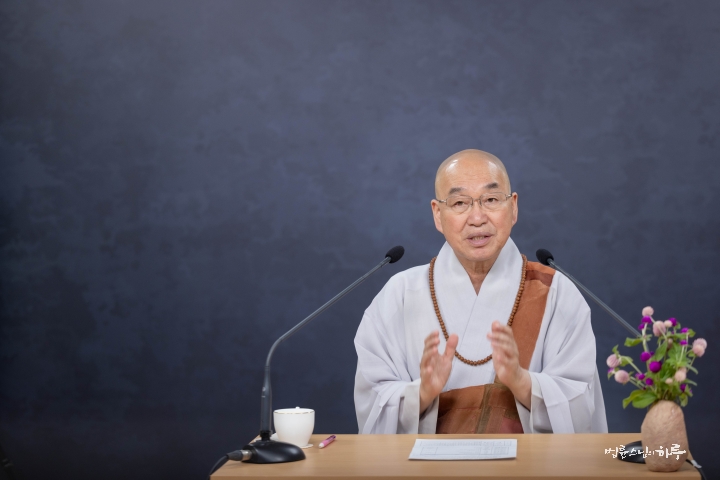
Second, she shouldn’t argue about who’s right or wrong. People whose businesses are failing are under a lot of stress. If they feel that their wife is nagging on top of that, their anger will intensify, leading to not only financial loss but also family discord. So the questioner should mentally let go completely and stop thinking about issues that have no solution. If the lender says something, she should respond, ‘I’m sorry. We’ll repay as our circumstances allow,’ and not mention anything to her husband. If family money has already been borrowed and the business hasn’t recovered, it should be seen as having almost no chance. Of course, nothing in this world is 100% certain. Sometimes the economy might improve unexpectedly, or some connection might lead to recovery. However, generally speaking, her husband’s business should be seen as having almost no chance of recovery.
Right now, the person who’s most distressed is her husband. When a business isn’t doing well, the most distressed person is not the onlooker but the business owner himself. If you keep nagging on top of that, it will only lead to anger, irritation, and fights. It’s sad, but she should let her husband do what he can, while letting go of her own attachment. She shouldn’t keep getting drawn into the situation.”
“Yes, thank you. I was caught up in my own thoughts and only resented my husband. Now I think I can look at my husband more calmly with an open mind.”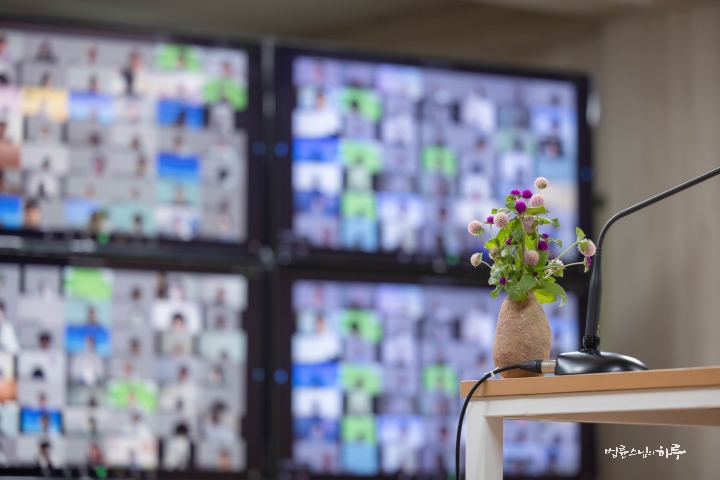
The questions continued. When the dialogue ended, it was 11 AM. While Jungto Society members shared their thoughts in groups, Sunim left the broadcasting room and moved to the Dharma hall to attend the memorial service.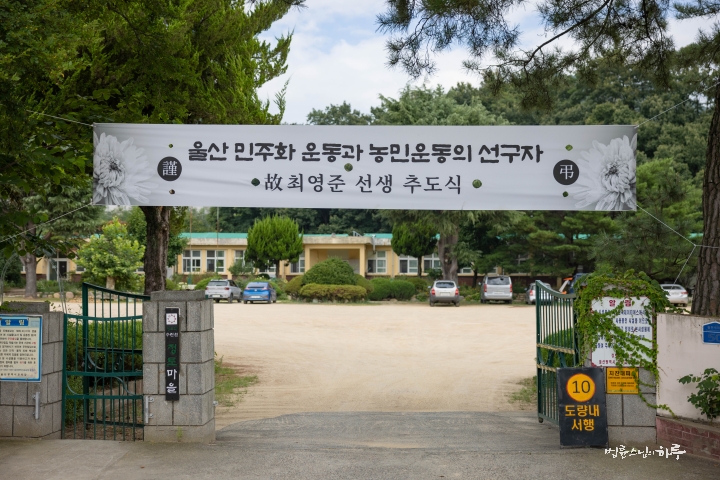
At 11 AM, the memorial service for the late Mr. Choi Young-jun, who played a pioneering role in the democratization movement and farmers’ movement in the Ulsan area, began. Mr. Choi was also Sunim’s older brother by birth. As Mr. Choi passed away suddenly while Sunim was on a tour of 10 Southeast Asian countries over the past month, Sunim couldn’t attend the funeral. So today, on the 5th of the 49-day memorial period, a memorial service was held with about 80 representatives from Ulsan civic organizations in attendance.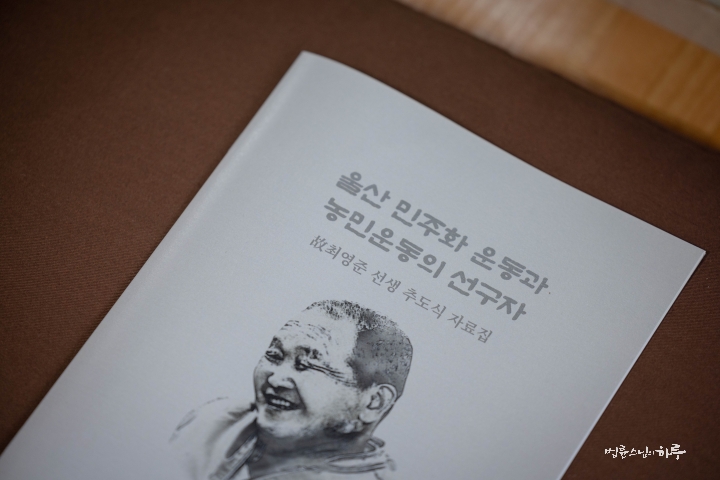
Before the memorial service, after performing the offering ritual and invocation of the spirit, there was a time for offering incense. The vice chairman of the Ulsan Democratization Movement Memorial Association offered incense on behalf of the guests.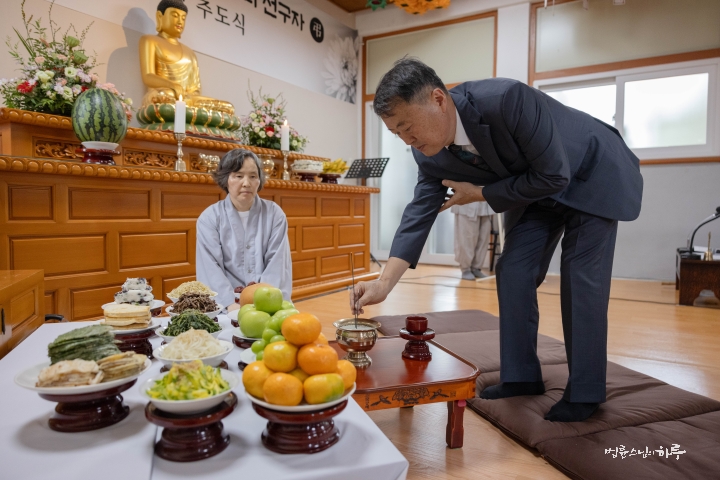
Then, the chief mourner offered tea to the spirit tablet, and the family members performed three bows together.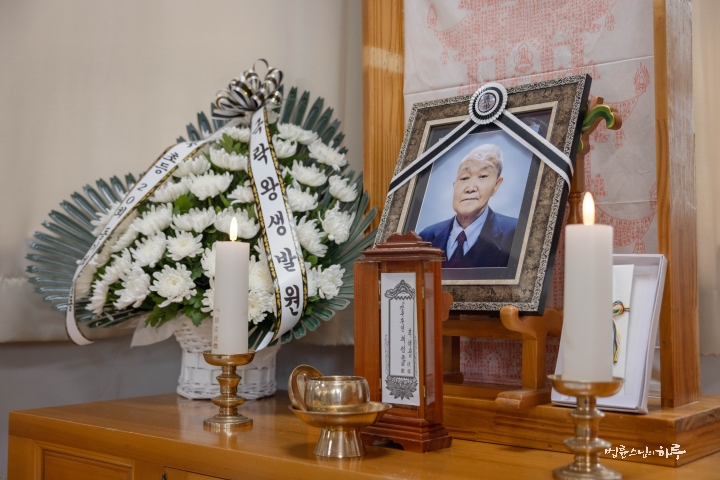
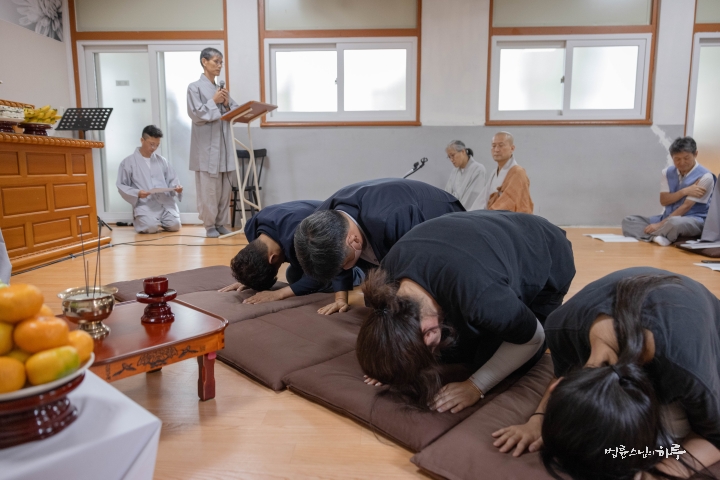
Next, Professor Lee No-hyung, a former professor at Ulsan University, introduced the biography of the late Mr. Choi Young-jun. As the footsteps of Mr. Choi, who played a pioneering role in the democratization movement and farmers’ movement in the Ulsan area, were recited one by one, the attending guests quietly wiped away tears.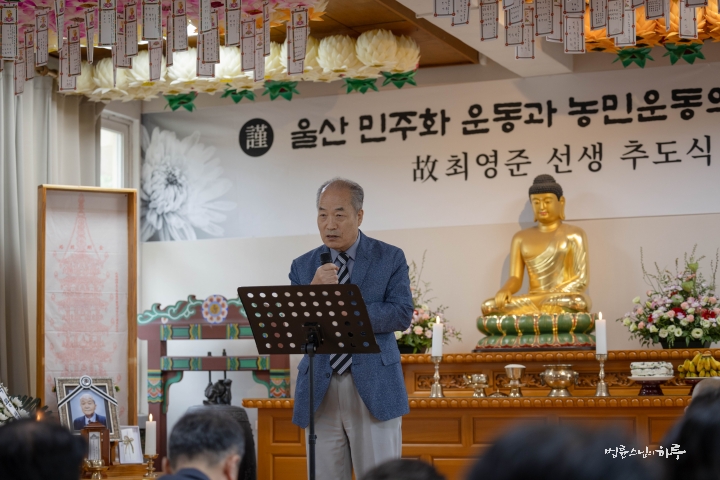
“The deceased left home at the age of 16 and lived in Seoul. Starting with participation in the April 19 Revolution, he became aware of the movement for citizens to become the true owners of the country. Returning to his hometown, he began farming and spearheaded the establishment of the local Catholic Farmers’ Association, leading a movement where farmers became the main actors. Later, as the chairman of the farmers’ division of the National Movement for Winning a Democratic Constitution in Ulsan, he played a role in encouraging many citizens to participate in the struggle for direct presidential elections and the June Democratic Uprising. He also led the founding of the Ulsan Anti-Pollution Movement Alliance and the Ulsan Environmental Movement Association. His activities were comprehensive, and he never lost his initial passion, continuing his social activism until his passing. I am still learning a lot while recording the life story of this elder. Thank you.”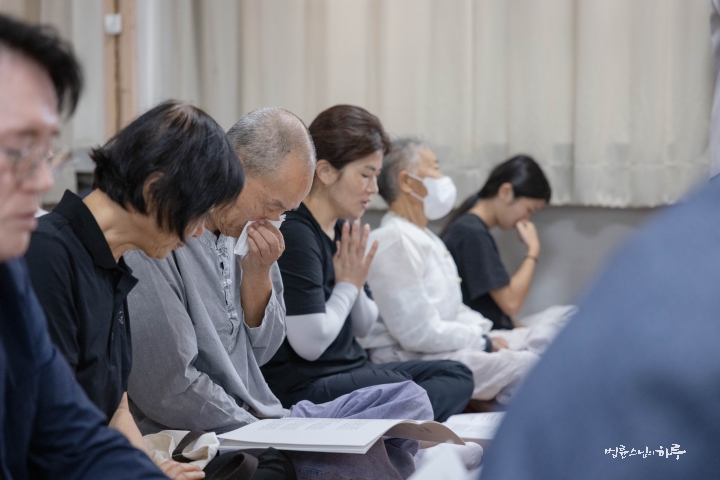
After briefly recalling the life of the deceased, it was time to listen to eulogies. First, Chairman Choi Min-sik of the Ulsan Democratization Movement Memorial Succession Association delivered a eulogy.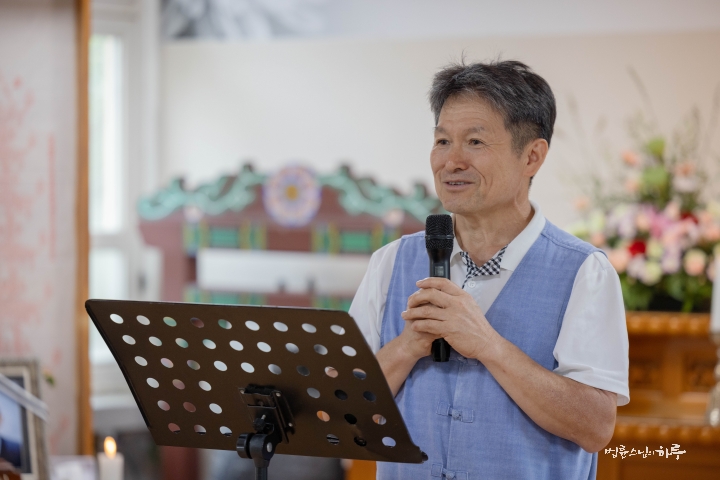
“As I listened to his life history, I remembered something. His wife had a hard time because he didn’t farm as he was supposed to, but instead did many unnecessary things. However, so many people have come here to pay tribute and carry on the legacy he left behind. I hope that in his next life, he will come back as someone who takes care of himself a little more while living.”
Next, Lee Hyun-sook, co-chair of the Ulsan Environmental Movement Association, gave a eulogy honoring the deceased.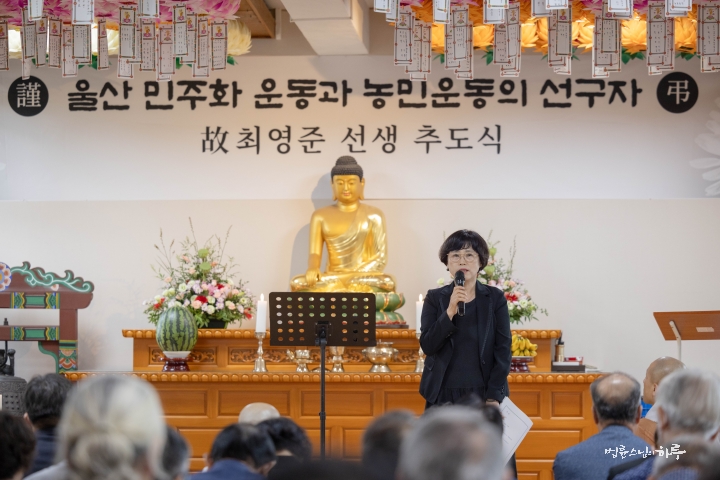
“Through him, I first saw a farmer engaging in the farmers’ movement. He played a significant role in initiating the environmental movement in the Ulsan area, but we always repaid his kindness by helping with farm work. Whenever there was a rally, he would come with soil on his sneakers as if he had just been working in the fields. That’s how he lived his entire life, like a young man. We will inherit that energy and live diligently as well.”
Listening to the eulogies, it felt as if the late Mr. Choi Young-jun’s presence was vividly brought to life. Praying for his rebirth in the Pure Land, we sang “Farewell, Dear One” together and recited a prayer for liberation.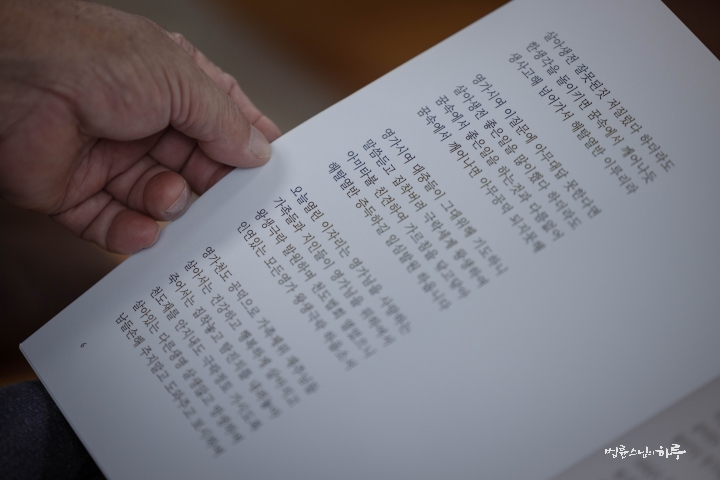
Then, Sunim gave a Dharma talk for the deceased’s deliverance. The chief mourners took their seats in front of the Dharma platform, holding the deceased’s portrait and memorial tablet.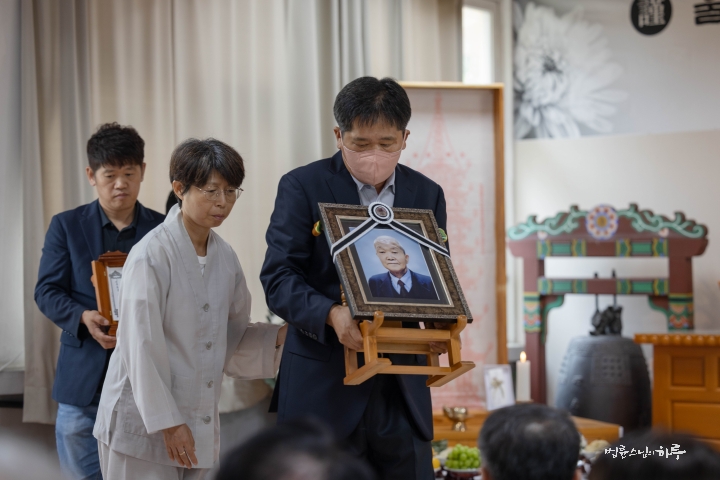
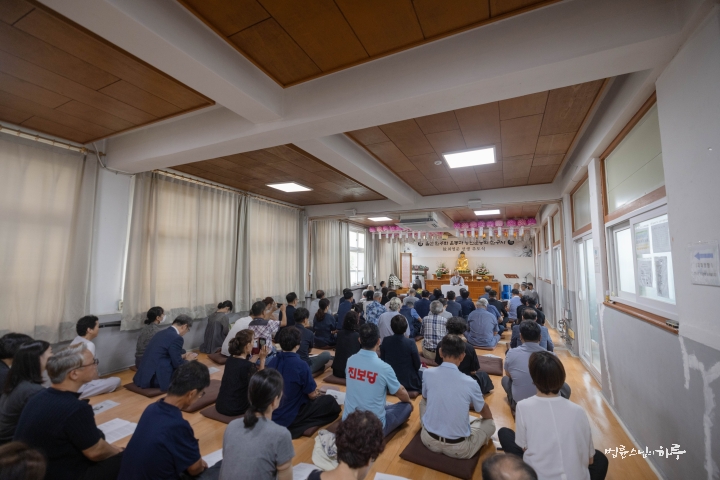
Among the guests were many Christians and Catholics. Sunim explained the purpose behind the ritual of delivering the deceased.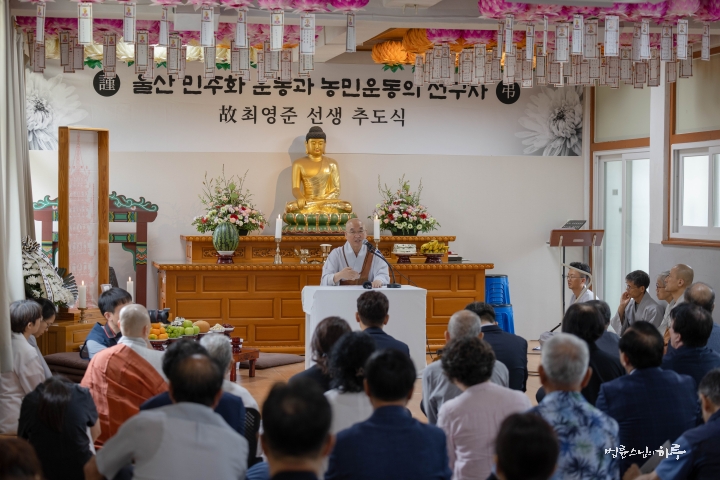
“The word ‘deliverance’ means to set right what has been turned upside down. In Sanskrit, it’s called ‘ullambana’. Why do we say it’s upside down? As we live in this world, we try hard to live well. From birth until death, we try to earn money and live well for our families, but in the end, the results of those actions turn out to be all losses. When actions intended to go to heaven end up being actions that lead to hell, we say this is upside down. Setting right what has been turned upside down is called ‘deliverance’.
How to Set Right What Has Been Turned Upside Down
So what is most helpful in setting right what has been turned upside down? Giving is most helpful. That’s why in ‘cheondobje’ (deliverance ceremony), the ‘je’ character used is not the one for ‘ancestral rite’ but the one for ‘giving’. It means that when we give to those in need, by that merit, the person who was upside down can be set right. To perform deliverance, giving is most important. This is because the actions I took to survive may have caused losses to others, and my anger and venting may have deeply hurt someone else’s heart.
As we go through life, we unknowingly cause pain to others, harm them, and inflict losses. However, we cannot go and give to each and every unknown person we may have harmed. So we are instructed to give to the hungriest and poorest people in this world right now. Then it will return to those we have harmed. Therefore, when giving, we should give to the hungriest or poorest people. In the past, when a deliverance ceremony was held, they always prepared a lot of food and distributed it all to people that day. The reason for preparing a lot of food for the ceremony is not for ghosts to eat and leave. It’s to make food for hundreds or thousands of people and distribute it to many hungry people.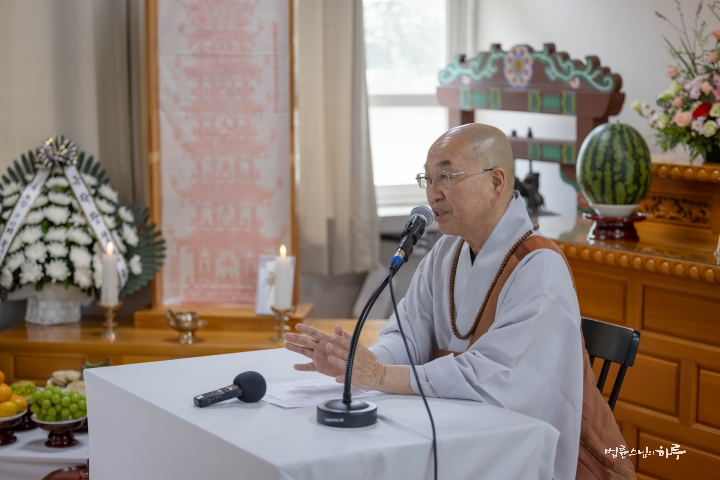
There’s an interesting old story related to the deliverance ceremony. In the past, a rich family donated 100 sacks of rice to a temple, asking them to perform a good deliverance ceremony for their parents. At that time, 100 sacks of rice was a huge amount of money. The head monk received the money but instead of preparing for the ceremony, he went around giving it all away to poor people and beggars. The temple’s abbot was very worried about the head monk’s actions. When money is received for a ceremony, they should go to the market and prepare food, but he kept giving all the money to poor people. The 49-day ceremony was approaching, but the head monk didn’t tell them to prepare for it. So when the abbot told the head monk they needed to prepare for the ceremony, the head monk said, ‘Don’t worry. I’m taking care of everything.’ But he wasn’t making any preparations.
Finally, the day before the ceremony, the head monk went to the market and bought a handful of bean sprouts and a few vegetables. He personally blanched and stir-fried them in the kitchen to make side dishes. On the morning of the ceremony, the head monk placed the three side dishes he had made the day before on the altar for the deceased, struck the wooden block three times, and said, ‘The ceremony is over.’ A little later, at 10 o’clock, many relatives came to attend the ceremony.
But since nothing was prepared, they complained to the abbot. The abbot said he didn’t know anything and told them to ask the head monk. When they went to the head monk and complained, he said:
‘I have performed the 49-day ceremony well. The leftover food is in the kitchen if you want to eat it before you leave.’
People who didn’t understand the meaning were making a fuss, but there was a wise person in the family who asked the abbot what the head monk had done with the 100 sacks of rice.
‘The head monk gave away all the money for the ceremony to poor people over the 49 days.’
When the son of the family heard the abbot’s answer, he understood and said, ‘The deliverance ceremony has been well performed. Let’s go home,’ and the situation was resolved. This is the spirit of ‘JE’ (giving).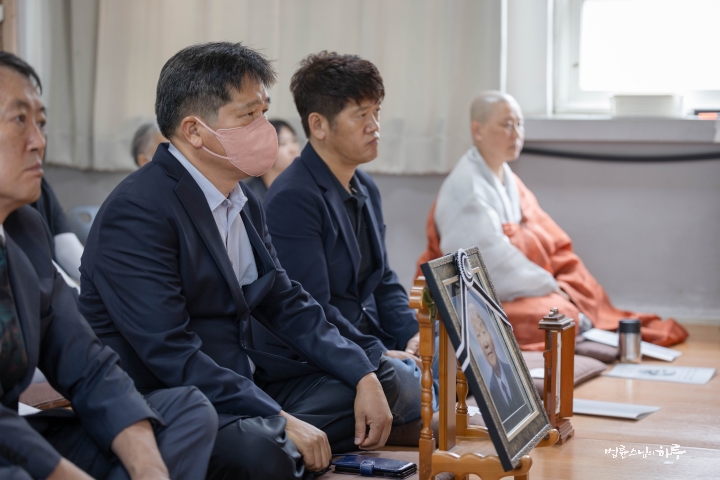
There’s another story. In the past, when they held a ceremony, they would set out a table full of food and perform rituals for four or five hours. Outside, villagers and beggars would gather and wait, starving, but the ceremony wouldn’t end. Then the senior monk took all the food prepared for the ceremony in the Dharma hall and distributed it to the people outside, causing chaos. When people protested, saying ‘We’re in the middle of a ceremony, what are you doing?’, the head monk scolded them, saying, ‘The ceremony is about feeding hungry people, so what are you doing while there are hungry people right here?’ Now I’m also talking a lot while there are hungry people, aren’t I?” (Laughter)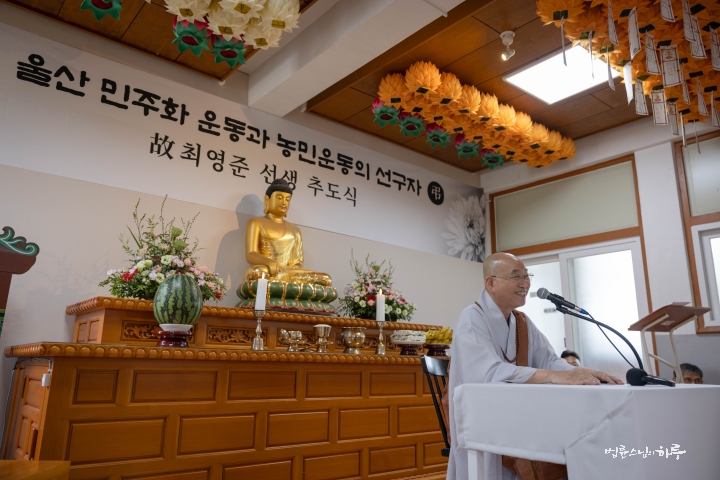
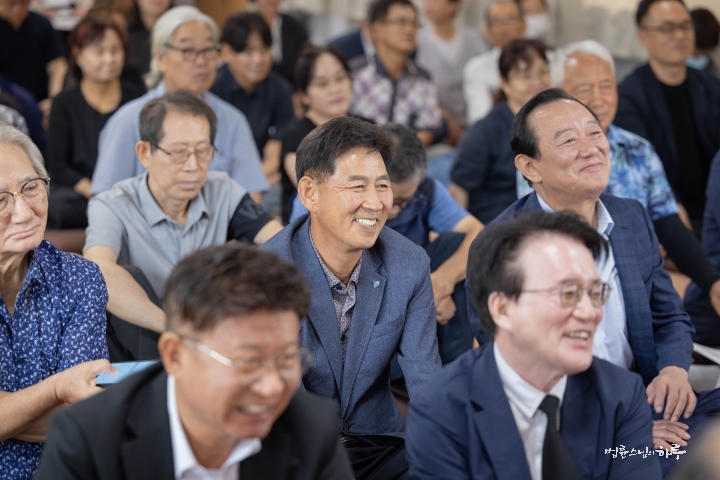
How to Best Perform Deliverance Ceremonies
This is the original meaning of ‘JE’ (giving). That’s why we use the character for ‘giving’. If we inherit this intention, how should we perform ceremonies these days? In today’s era, even if we prepare a lot of food, there’s no one to eat it. So at Jungto Society, we don’t say ‘Pay this much and we’ll perform a deliverance ceremony for you.’ When a family makes an offering, we use all that money for poor children in India or North Korea, or for relief activities for children in third world countries. We use the ceremony fees this way, not for running the temple, because this is the best way to perform the ceremony, and doing so brings great merit to the deceased.
So to perform a good ceremony, we must give. Then why did this culture of performing ceremonies arise? I think it all came from one aspect of our human life. If I hit someone and went to prison, what should be done? The remaining family members, parents or siblings, should pay money to the person who was hit and reach a settlement. Similarly, the remaining family members should give on behalf of the deceased. Secondly, even if compensation is made, if the person keeps insisting they did nothing wrong, the problem isn’t solved just with money. So the person themselves must repent and admit their wrongdoing. In other words, they must realize through the ceremony. They should listen to the Dharma talk, realize what their problem was, become aware, and repent for their foolish self. If they don’t reflect on themselves and just try to cover it up with money, it doesn’t fundamentally solve the problem. That’s why repentance is necessary, and why there’s a Dharma talk. We give a Dharma talk for the deceased’s deliverance so that the deceased can listen, realize, and repent.
The reason the officiant shakes the bell while performing the ceremony is that even if the person has realized and made compensation, it takes time for the judgment to come out. So they need to taste a little bit of heat. In the *Ksitigarbha Sutra*, Ksitigarbha Bodhisattva appears. Ksitigarbha Bodhisattva is the one who vowed not to attain Buddhahood as long as there is even one being left in hell. So if I fall into hell, who would be more heartbroken than me? It’s Ksitigarbha Bodhisattva. So we should call on Ksitigarbha Bodhisattva to prevent us from going to hell in the first place. That’s why we pray to Ksitigarbha Bodhisattva during the 49-day period.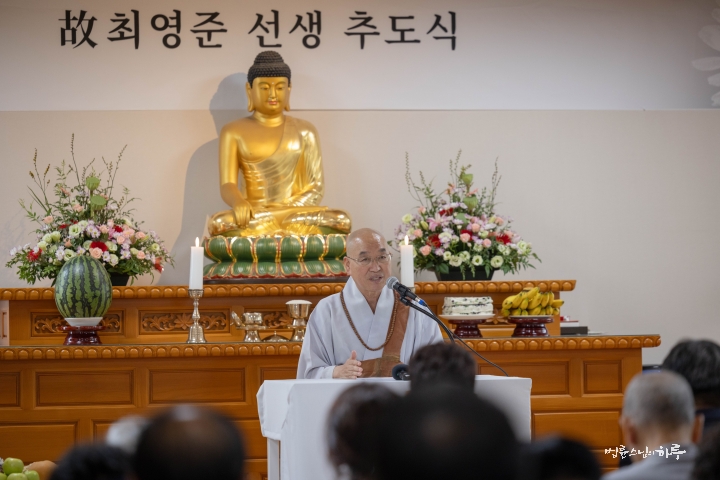
The Three Reasons Why Deliverance Ceremonies Were Created
So when performing a ceremony, three things must be present. First, we must listen to the Dharma talk and realize. In other words, we must reflect. Second, we must give to make amends. Third, we must temporarily relieve suffering through the merit of someone with a great vow. We can’t endure even one second when it’s hot, right? The deliverance ceremony was created for these three reasons, but as time passed, the intention disappeared and only the form remained. Especially the culture of deliverance ceremonies that only seek money remained. For this reason, more and more people have come to have a very negative perception of ceremonies. However, I think the original intention of performing deliverance ceremonies is good. Even if it’s performed as a different religious ritual, I think the intention is the same. It’s very meaningful to give some of the deceased’s assets to those in need, invite a great pastor, priest, or admirable person from society to give a Dharma talk on how to live life and realize once again, and rely on the power of whatever you believe in, be it God or Ksitigarbha Bodhisattva, to pray for temporary relief from suffering. I think this is a very meaningful ritual for both the deceased and the remaining family members. And performing such a ritual for death is because death is fearful. This ritual also helps to overcome fear a little bit.
However, the Buddha’s original teaching is to fundamentally escape from all fears. If there is no fear itself, there is no need for such rituals. Because everything arises from fear, and these rituals were created to escape from fear. Whether you all have the same religion or different religions, or whether you have a religion or not, you will often have occasions to participate in such 49-day ceremonies as you live your life, so I gave a little explanation about its purpose.”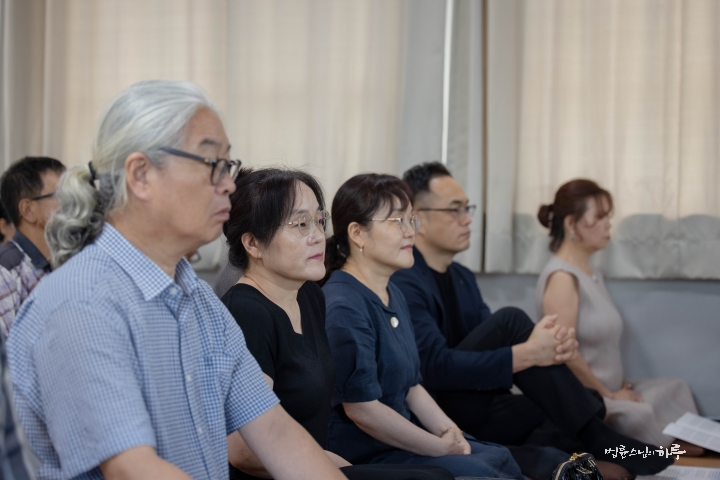
After the Dharma talk, we chanted a solemn Buddhist chant, praying for the deliverance of the deceased. The chief mourners first offered tea at the altar, followed by the guests who came up in turn to offer tea.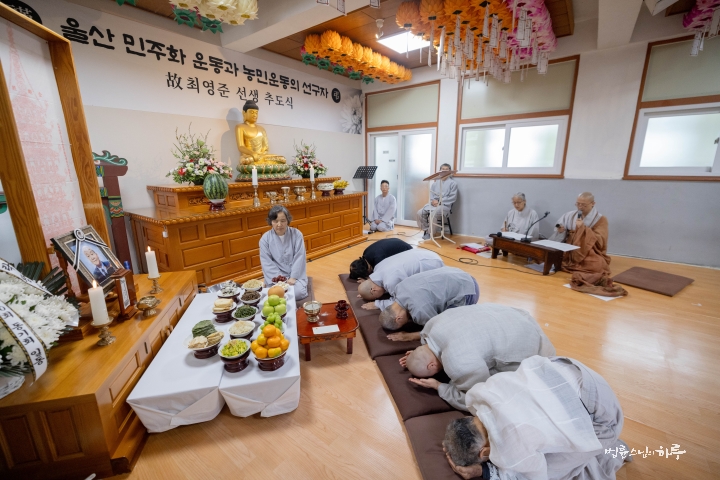
Finally, we sang “Return to the Light” together, praying for rebirth in the Pure Land, and concluded the deliverance ceremony.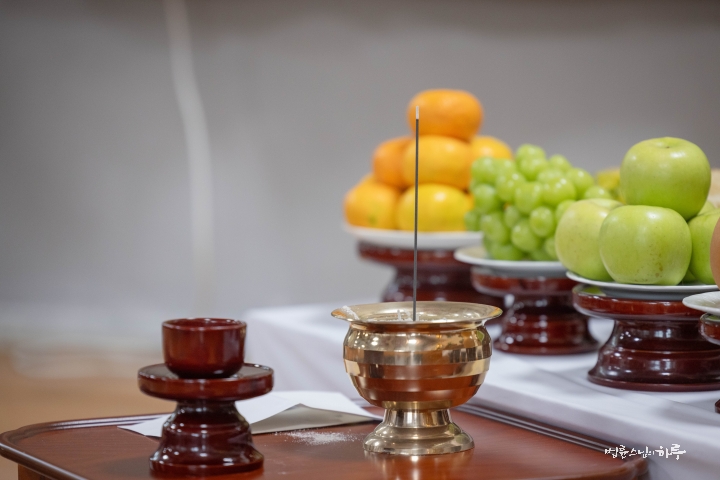
Next, we had time to hear from the attending guests. First, Choi Han-sil, the deceased’s second younger brother and director of the eco-community ‘Pureunnuri’, shared his thoughts.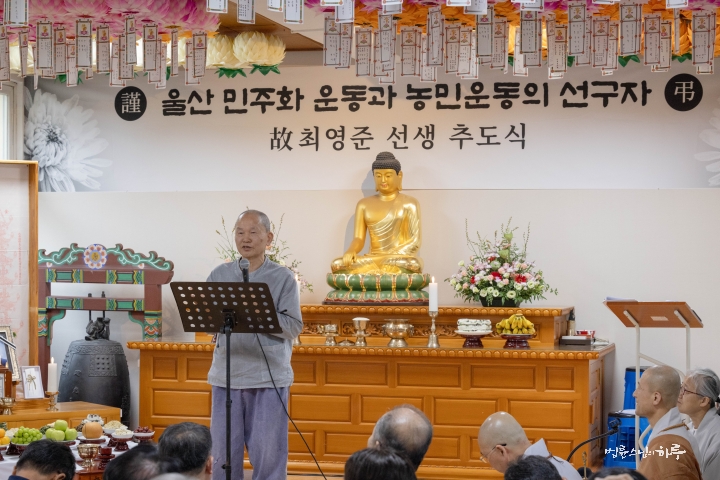
“As you all know, my brother was truly a pure person. I think that’s why he was able to engage in so much social activism. It’s difficult to maintain a resolve to the end unless your heart is pure. I think it was his pure heart that gave him the strength to live consistently through all kinds of adversity. I want to remember that heart.”
Pastor Han Ki-yang, representative of the Ulsan Climate Crisis Emergency Action who led the Ulsan environmental movement with the deceased, also shared his thoughts.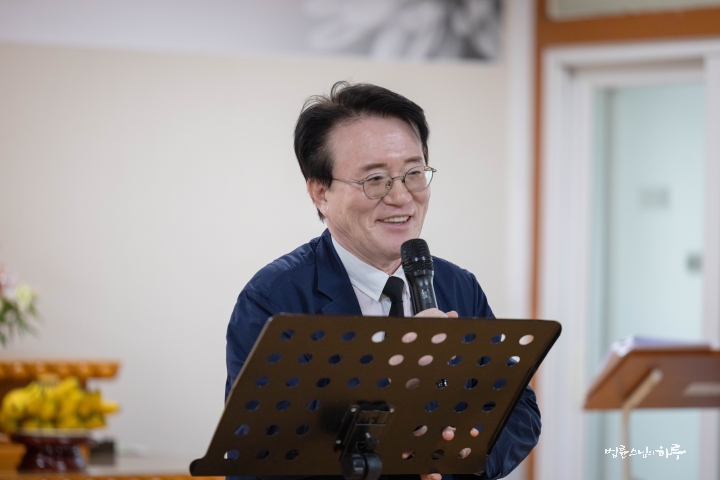
“When I opened a pioneering church in Ulsan and ran a workers’ house, I was really poor. During that time, the teacher would come carrying a sack of rice on his back, leave it in front of the front door, and leave. That’s how I received a lot of affection from the teacher. Now that the teacher has passed away, I feel like I’ve lost my hometown. Teacher, rest peacefully in a good place.”
Next, Dharma teacher Hwagwang, who has been with the late Mr. Choi Young-jun since the beginning of Dubuk Jungto Retreat Center about 20 years ago, shared his thoughts.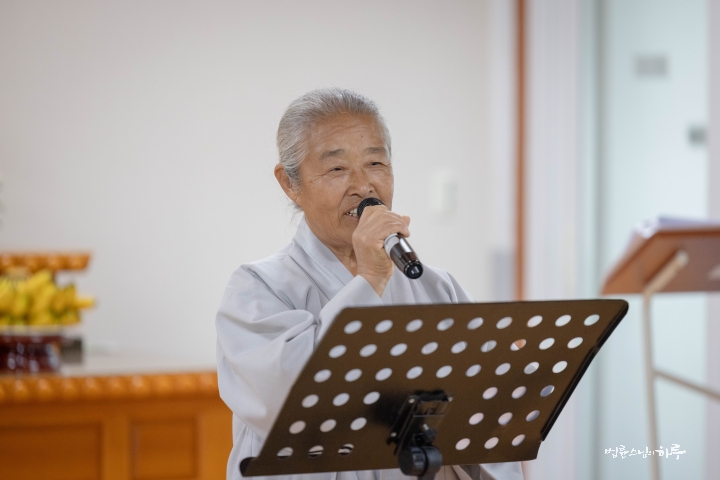
“When I came down here with no farming experience and was struggling, the teacher was a kind person who taught me one by one how to farm. Thanks to the teacher’s help, we have been helping elderly people living alone in 13 villages in Ulju-gun for over 20 years. I will not forget the teacher’s warm heart and will continue to work steadily in the future.”
Next, we held hands and sang “Evergreen Tree,” a song the deceased liked during his lifetime, with the intention of not forgetting the teacher who became a new hope and light for the democratization movement and farmers’ movement, and to practice his teachings.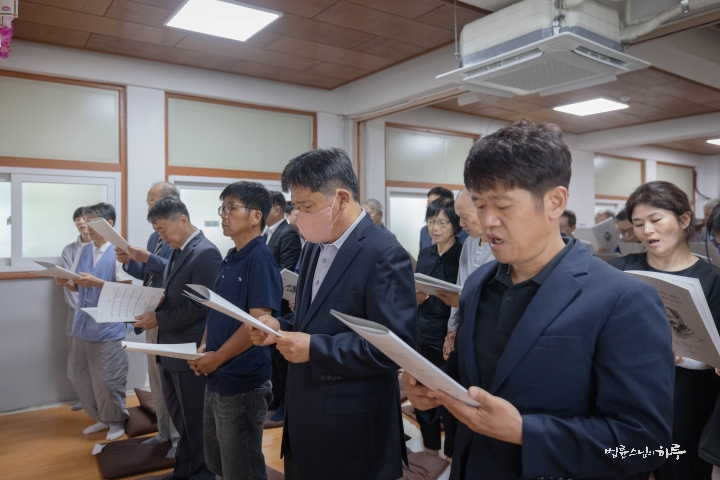
Finally, Sunim gave a greeting to the attending guests.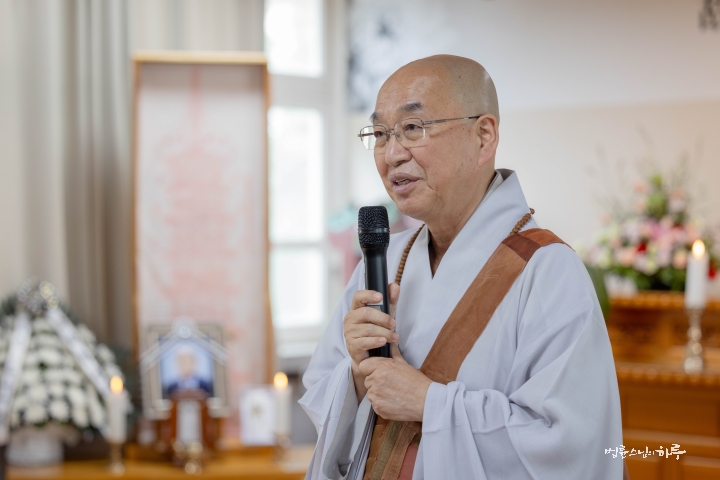
“Despite living his entire life as a farmer in the countryside, my brother had such unwavering principles that his family often found his lifestyle difficult to understand. However, when we look at our society as a whole, I believe he did essential work and lived a life ahead of his time. As we bid farewell to him, I would like to express my gratitude to his wife and family members who supported him through hardships. Once again, I thank everyone who has attended today.”
The memorial service concluded with a round of applause.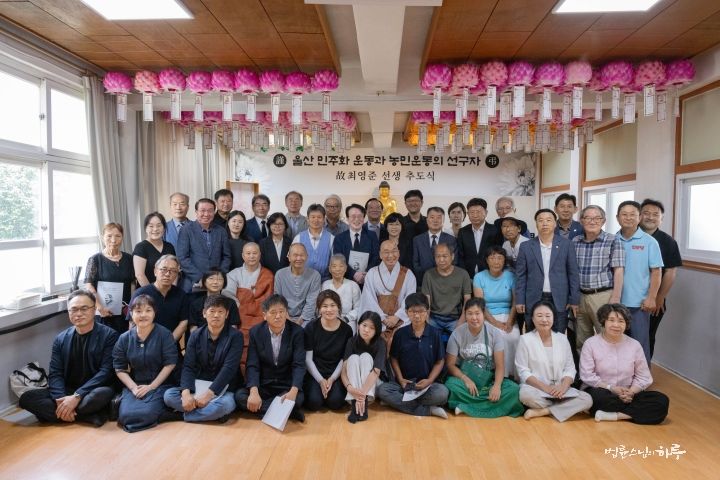
After taking a group photo, everyone shared a lunch prepared by the Dubuk Retreat Center.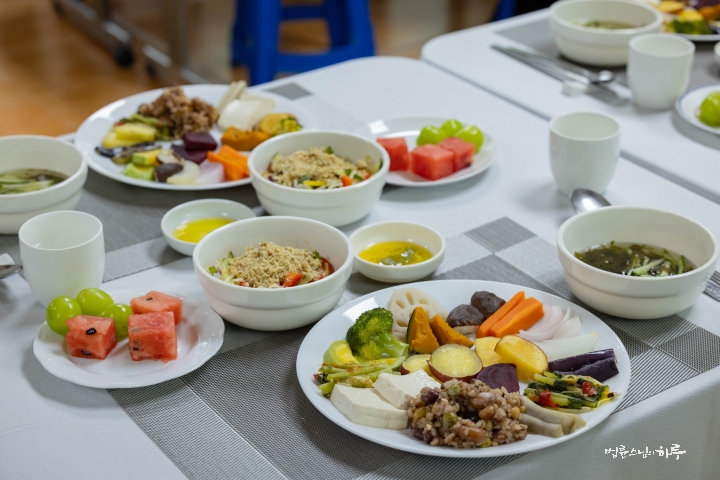
As the guests began their meal, Sunim went from table to table, greeting them.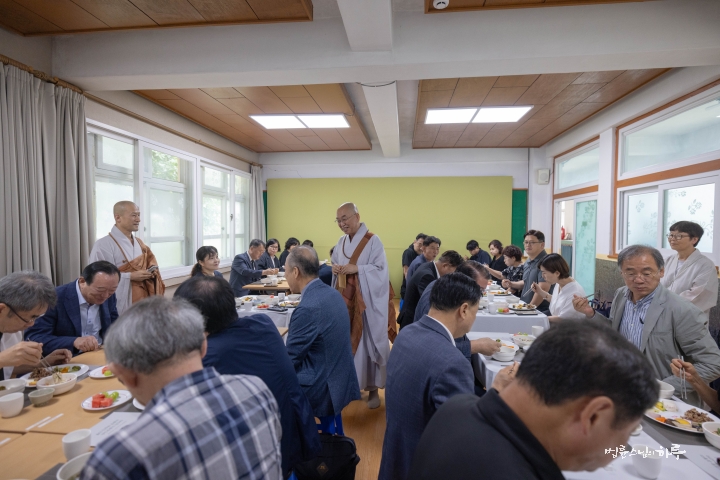
“The prepared meal is a healthy diet for cancer patients, made with ten different vegetables. It might not be the most flavorful, but it’s very good for your health.”
“This is the ultimate health food. Thank you.”
Separate dining areas were arranged for family members, civic group activists, and school alumni. As guests finished their meals and prepared to leave, they were given gifts of Sunim’s books, rice cakes, and a bag of glutinous rice grown at the Dubuk Retreat Center.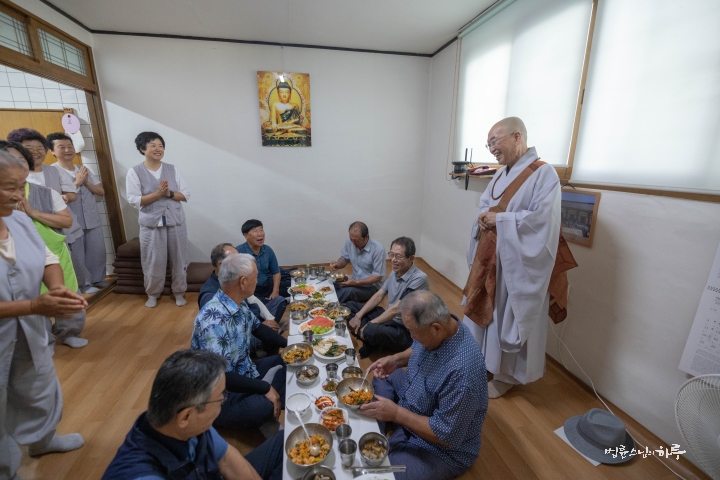
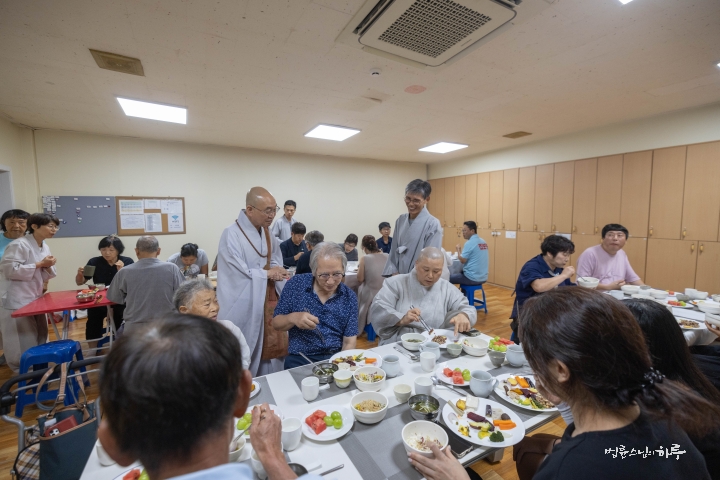
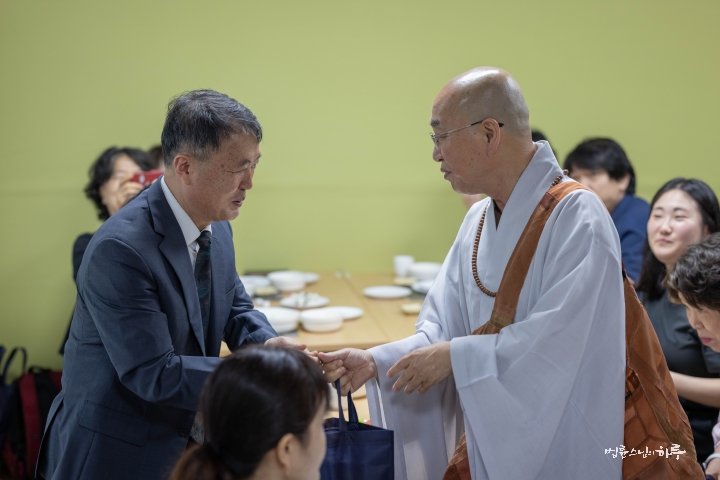
After all the guests had departed, Sunim spent the entire afternoon with his family. They shared many old stories, catching up after a long time.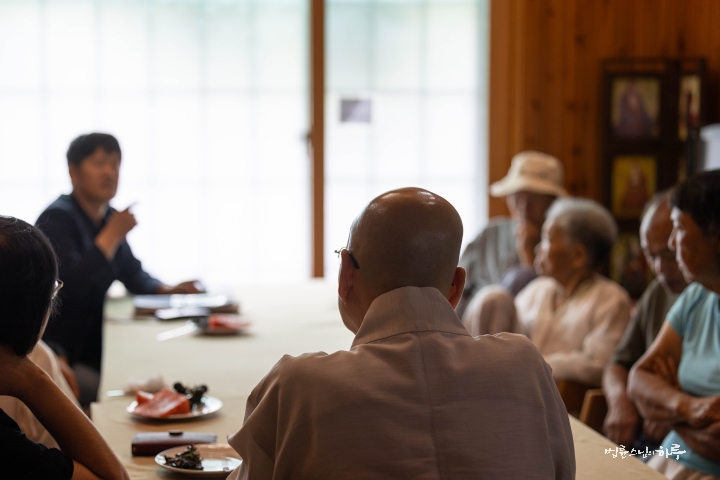
Once the family members had all returned home, Sunim spent the evening proofreading manuscripts and attending to various tasks before concluding his day.
Tomorrow, he plans to spend the entire day farming.
A Day in the Life of Sunim is translated by AI, edited by volunteers




